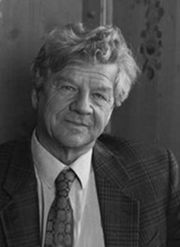|
DEPARTMENT OF ANTHROPOLOGY- HUMAN BEHAVIOR RESEARCH | staff
|
Prof.
Dr.Dr.h.c. Max-Planck-Institute
for Behavioural Physiology Phone
+49/8152/373-59, email: eibl@orn.mpg.de |
 |
|
Curriculum vitae Prof. Dr. I. Eibl-Eibesfeldt, born in Vienna, June 15, 1928,Austria. 1945-1949 study at University of Vienna (Zoology). Promotion Dr. phil. December 1949. 1946-1948 research associate at the Biological Station Wilhelminenberg near Vienna. 1949 research associate of the Institute for Comparative Behavior Studies in Altenberg near Vienna (Head: Prof. Konrad Lorenz). 1951-1969 Max-Planck-Institute for Behavioral Physiology (first in Westphalia, from 1957 at Seewiesen, Bavaria); 1960 guest Professor for one term at the University of Chicago and 1966 at the University of Minnesota. 1963 habilitation at the University of Munich. 1970 Prof. of Zoology at the University of Munich. Since 1970 Head of a Research Group for Human Ethology which became an independent Research Institute for Human Ethology of the Max-Planck-Society in 1975, first in Seewiesen and now in Andechs. 1957-1970 Honorary Scientific Director of the International Institute for Submarine Research in Vaduz. Since 1992 Honorary Director of the Ludwig-Boltzmann-Institute for Urban Ethology in Vienna. The first 20 years of his scientific career (1946-1966) were devoted to comparative vertebrate ethology focusing on communicative behaviors and the study of ontogeny, in particular of mammals. Diving expeditions (Xarifa Expeditions, lead by Prof. Hans Hass) 1953/54 Caribbean Sea (Galapagos) and 1958 Maldives, Nicobares. 1957 Head of the UNESCO expedition to the Galapagos Islands. 1967 first textbook on Ethology. From the midsixties studies on Human Ethology. Studies of the expressive behaviors of deaf and blind born, and start of cross-cultural documentation of human behavior. Through these studies he established the discipline of Human Ethology. Foundation of the Ludwig-Boltzmann-Institute of Urban Ethology in 1992. Director of this institute. Numerous anthropological expeditions to document in longitudinal studies the everyday life and rituals of the Yanomami (Waika-Indians Upper Orinoko, South America), Hima (Namibia), Kalahari Bushmen (!Kung, G/wi, !Ko, Botswana), Eipo (West-Irian, New Guinea), Biami (Papua New Guinea), Bali and Trobriand Islanders. Since 1950 married to Eleonore Eibl-Eibesfeldt Ph.D., two children, Bernolf and Roswitha.
Numerous publications
Honorary-offices
and memberships:
Awards: |
|
|
UNIVERSITY OF VIENNA all rights reserved karl.grammer@univie.ac.at |
|